It is often said that you never know how you’re going to respond in a tragedy until it hits. There is some truth to that. But we, as Christians who care for young people, can be thinking through how to respond before there is a tragedy that hits your church’s community. In these moments, we get to share hope in the cross of Jesus and remind them that, in the midst of the darkness, God is with them.
In Spring of 2021, there was a fatal car accident that impacted one of the high schools in our town. One student passed away and the other three students in the car were seriously injured. I was in a unique position where I was a part-time Paraprofessional at the school impacted as well as a DCE at the church I currently serve at. As I sat in emergency meetings on how the school was going to respond to this, I realized that the church needed to support the staff at the school as they were processing not only this tragedy but also coming out of Distance Learning for the first time in five months.
After the first meeting, I sent a text to our senior pastor and I said, “I think we need to do something to help this school”.
He replied, “Figure out how we can bless them, and we’ll make it happen.”
We know when hard things hit our community, each situation is going to be different. Regardless of the circumstances, we can always bring hope in the Gospel. And, I believe the questions we ask ourselves and the teams we work on can remain the same:
How can I be more involved with the local schools?
It took me working as a Paraprofessional at one of our public high schools for six years to realize that we, as the church, can work with the public schools in our areas. I was able to foster relationships between teachers and administration team with our church. This can be something you can do now, without any tragic circumstances
Don’t be afraid to ask your local schools how you can connect with them, especially in the wake of a disaster. See if you can supervise lunch to get to know staff that way. Set up a time to drop off coffee and donuts for the staff one morning. When you set up the relationships along the way, you’re able to show up better when a tragedy hits your community. God can use these relationships to open up doors for you to share the Gospel.
Who are the students that will be most impacted by this?
There will be students who are hit by certain tragedies more than others. Identify the students that may need to talk more about what just happened. Be open to set up meetings to talk through feelings and emotions. Be available to pray with students whenever they need it.
But also, be cognizant of how much they’re already talking about it. It’s possible that they’ve had to talk about it in every class period at school and by the time they get to your midweek or Sunday school class, they just want to have normal conversations that doesn’t involve whatever just happened. And that’s ok. Go into conversations flexibly, knowing the Holy Spirit will guide you and give you the words to say.
Who are the leaders who need to know what’s going on?
If you have them, this is the time to use your small group leaders or supportive adults! You’ve entrusted these adults to walk alongside your students on a weekly basis so make sure that, just like you identified the students most impacted, you also identify the leaders who will be most impacted. We don’t have to do any of this alone. It’s important to let God work through other adults as well. Pray together and equip them with tools to walk alongside students to share hope in Jesus amid tragedy.
How can we, as a church, be a support to not only the schools but the community in general?
With tragic events, there’s a high possibility that there will be ripple effects into the community. A neighbor of someone directly impacted could be a member of your congregation and they call you wanting to know how they can support the families involved. Maybe businesses you frequent are somehow impacted. Maybe you have a sizable building that you could open up for prayer surrounding the events or bring in Christian counselors to meet with people who may need to talk.
Jesus tells us we are called to not only have eyes for our own people but to go out into our communities. Throughout His ministry, Jesus healed those who were suffering. He offered them forgiveness of sins, physical health and hope. In the same way, the Holy Spirit gives us what we need to walk alongside people during tragedy in our community and point them to the One who loves and saves us His children.
So, what did my church end up doing to support the school? Over the course of the first week after the car accident, I told myself I was going to say ‘yes’ to every conversation someone at the school wanted to have. I wasn’t going to rush out of the building right when I was done for the day. I spent the week having conversations with teachers, other paraprofessionals, principals, and even the librarians. What I realized is that they needed us to support them as they supported the students. And since food is often a comfort to people, we ordered a grab-and-go breakfast type thing for teachers to grab as they were getting ready for the day. I invited our senior pastor, care pastor, and his wife (their three daughters graduated from the school) to help deliver the food, get it set up, and just be a presence as teachers were coming and going. I introduced our senior pastor to the school administration, and we spent about an hour talking to people as they came through.
As I was cleaning up after the school day had started, the principal came into the staff lounge and he said to me, “Sarah, I want to thank you and your team for doing this. The fact that your pastors were willing to wake up early and just talk with us was absolutely incredible. You all were the blessing I didn’t know we needed.” Later that day, I was talking with one of the assistant principals and he said, “Maybe churches and public schools can work together to bless our communities. We have different approaches to what we do but we’re all working towards similar goals: to show up for kids and teenagers and make sure that they know they’re loved and supported.”
We can look throughout the New Testament and see examples of Jesus showing up for people in different and unique ways. He sat in homes of tax collectors. He talked with the woman at the well. He made it a habit of reaching the untouchables of society and showing them His forgiveness and love. He provided for their physical needs, but far more importantly, for their spiritual needs. In seasons of tragedy, we can provide for the physical needs of others. We can show God’s love and hope as we listen and care. We can share to Gospel through word and deed. Never underestimate the power of what God can when you simply show up.







0 Comments